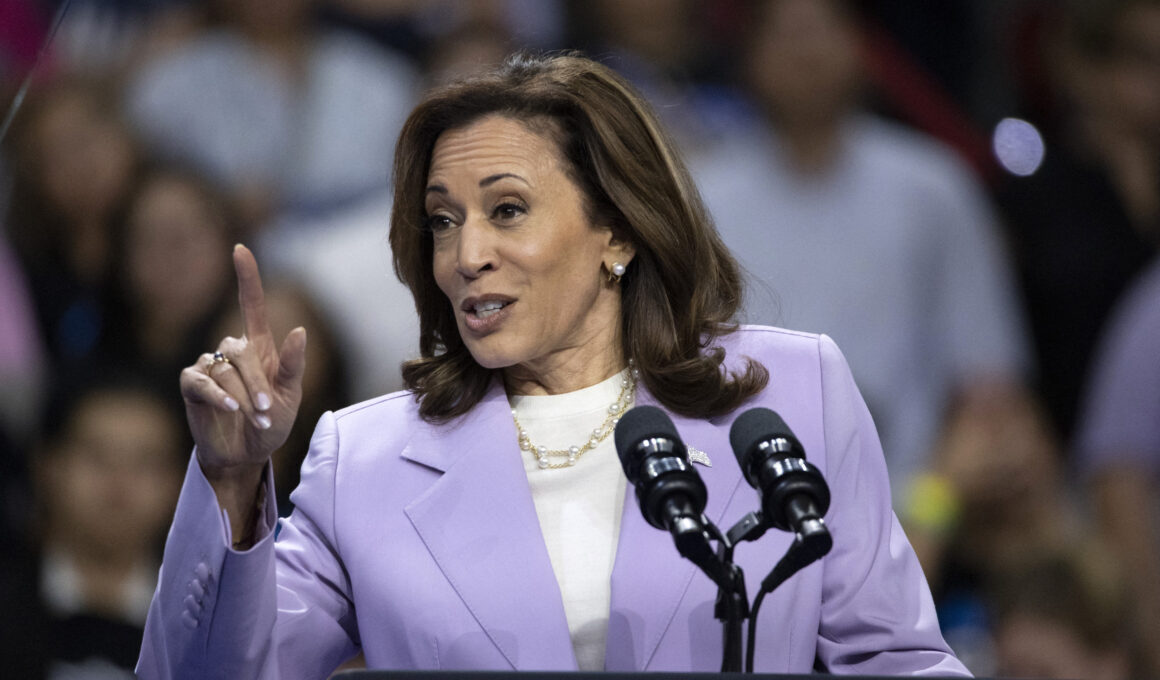Vice President Kamala Harris, the presumptive Democratic nominee, received a major boost from voters about the economy after President Joe Biden stepped down from this year’s presidential race, according to a new poll released on Sunday.
The economy has been a key issue amid the 2024 election as voters have indicated it is a priority. While Donald Trump, the GOP’s presidential nominee, has routinely called into question Biden’s economic stances, Harris has gained ground on the issue in the few weeks since she announced her candidacy following Biden’s decision to step down from the race on July 21.
A new poll released by the Financial Times on Sunday conducted for the newspaper and the University of Michigan Ross School of Business, shows 42 percent of voters believe Harris would be better at handling the economy while 41 percent trust Trump more on economic issues.
The poll of 1,000 registered voters, was first conducted from February when Biden was still in the race and continued through August when Harris took over the Democratic ticket, and has a margin of error of plus or minus 3.1 percent.
Sunday’s poll shows a boost in support as it is a 7-point increase from Biden as Harris is now narrowly ahead of Trump after the former president’s numbers remained unchanged from the two previous monthly polls.
Newsweek has reached out to Trump’s campaign and Harris’ campaign via email for comment.
According to the Financial Times, it is the first monthly poll to show Harris leading Trump on the economy since it began tracking voter sentiment on the issue nearly a year ago.
It follows a recent Morning Consult poll of nearly 5,000 registered voters that found Harris now leads over Trump when it comes to who would better handle housing. Harris also shrunk the gap with Trump on overall handling of the economy, unemployment, taxes and interest rates.
Trump and Republicans have traditionally performed better in polls regarding the economy.
July polling by YouGov found that only 29 percent of respondents thought that Harris would do a better job than Trump when it comes to inflation, while 43 percent had more confidence in the former president.
In April, a Harvard Youth Poll found that for young voters in particular inflation is a priority when it comes to electing a president. In that poll, confidence in Harris’ abilities to tackle inflation was higher among Democrats, with 63 percent saying they thought she’d do a better job than Trump, although the proportion of Republicans backing the former president on the issue was higher, at 86 percent.
It came as Biden’s administration has earned criticism from some Americans for its economic policies, largely because of widespread inflation that still remains high despite the Federal Reserve’s continuous interest rate hikes.
While inflation is now nearing normal levels, Biden, and in turn Harris, are still getting pushback based on new jobs numbers.
The job market is losing strength, with the United States reporting an uptick of just 114,000 jobs, while unemployment climbed to 4.3 percent in July.
This could complicate Harris’ bid for presidency, as rising unemployment levels often draw support away from the incumbent administration. Republicans have already latched onto last week’s less-than-ideal jobs report as an indication of the Biden-Harris administration’s performance.
However, Alex Beene, a financial literacy instructor at the University of Tennessee at Martin, said Trump could also be at odds with a sentiment that much of the economic success that took place during his administration was not actually related to his policies.
“I think this latest polling brings to the forefront of this election a question that was consistently asked during the last election cycle in the first Trump Presidency and ultimately played against him: ‘How much credit do we give President Trump for the economy during his time in office?'” Beene previously told Newsweek. “Virtually every metric we measure a healthy economy on did increase, but those gains were building on the already strong economic data coming out of Obama’s second term.”
Many of the economic wins that occurred under Trump’s presidency, like the lower gas prices, were due to the COVID-19 pandemic’s impact on traffic and not necessarily bills proposed by the White House, Beene said.
Meanwhile, Beene said some of the swift improvements in Harris’ economic policy voter perceptions could be due to the initial excitement around her entering the race.
“These numbers also could just come down to Harris being new to the race and the high levels of excitement that has brought to this election cycle,” he said. “It’s the first time in most voters’ lifetimes they’ve seen something like this happen, and instant polling is showing the results of that.”








